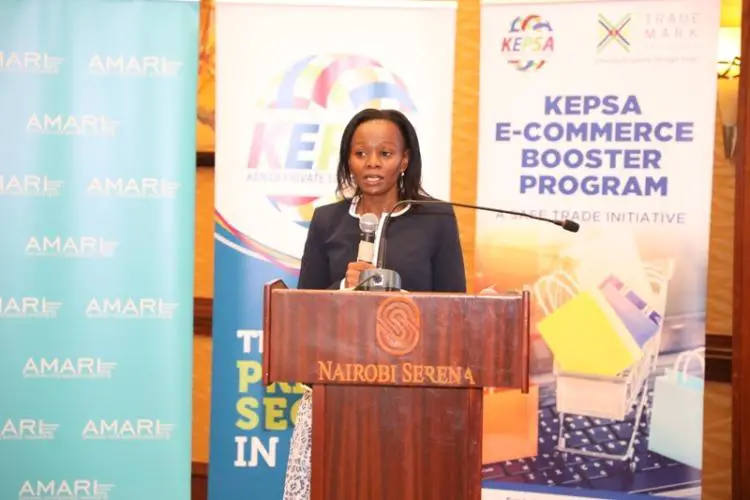The Kenya Private Sector Alliance (KEPSA) says its Booster Program targeting 2000 Micro, Small and Medium sized enterprises (MSMES) has surpassed the set target with over 2,500 MSMES receiving training on various issues.
Launched on launched on 25th February 2021, the training covered Introduction to e-commerce, digital marketing, aftersales, content creation & management.
KEPSA says 1300 businesses were on-boarded onto various ecommerce marketplaces to increase and diversify their revenue streams hampered by the Covid-19 pandemic.
The MSMEs targeted by the program were struggling with their digital brand presence with majority of the MSMES reporting they were either unaware of missed opportunities or did not have a digital brand strategy, which means they were edged out by their counterparts already offering their products and services online.
As the COVID-19 pandemic continues to cause disruptions in global and regional value chains, it is clear that e-commerce is an important tool and solution for both businesses and consumers.
E-commerce can support small businesses in reducing their costs and effectively reaching their customers; it is an economic driver for both domestic growth and international trade that makes economies more competitive.
The COVID-19 pandemic has occasioned a spike in business-to-consumers (B2C) online sales and an increase in Business-to-Business (B2B) e-commerce. The increase in B2C sales is particularly evident in online sales of medical supplies, household essentials and food products.
At least 2,000 MSMEs to benefit from KEPSA Ecommerce Booster Program
As a result, attention has been drawn to several challenges hindering the full potential of ecommerce across countries.
During the program, MSMEs gained the digital skills necessary to engage in the digital economy and improve livelihoods.
According to the Alliance, this also raised their proficiency in implementing effective digital campaigns, and increasing their brand awareness, value and sales conversions across multiple digital channels.
The trainers, who are at least 1,300 MSMEs, were on boarded on various e-commerce platforms thus increasing and diversifying their revenue streams.
Additionally, the MSMEs were able to expand their local and cross-border e-commerce presence.
The KEPSA Chief Ececutive Officer, Carole Kariuki acknowledged that the COVID-19 pandemic had pushed businesses to be innovative and get out of their comfort zones by expanding their sales and services on e-commerce platforms.
“We are trying to help business leaders understand what’s going on in the market and how the world is changing and help them identify strategic opportunities that are available and those that may not have been possible even just a year ago.”
Commenting on the same, Cabinet Secretary for ICT Innovation and Youth Affairs Joe Mucheru said the government is increasing the internet and mobile network grid in the country by investing in last mile connectivity.
“A 2020 report by the Internet World Stats rated Kenya’s internet penetration as the highest in Africa with 87.2 percent of the population connected. The e-commerce sector has significant potential to create new jobs directly on online marketplaces, supporting services and spin-off economic activities,” he said.
Trade Mark East Africa Kenya Country Director, Ahmed Farah HSC, noted that COVID19 has had a significant impact on the general economy.
Ecommerce in 2021: Kenya’s $1.5 billion industry
“Many enterprises have faced challenges which have in extreme cases led to business closure and loss of employment. Some of the measures that TradeMark East Africa prioritizes in its approach to work are aimed at ultimately reducing poverty and creating wealth for our people while we protect our environment,” Farah said.
KEPSA Founding Chair Dr. Manu Chandaria who said that the program was timely because MSMEs are the backbone of the country’s economy. He had earlier supported KEPSA’s revolving fund initiative by donating Sh5 Million to the program.
Adolfo Alonso, the Finance and Private Sector Development Programme Manager at the European Union(EU) Delegation to the Republic of Kenya, appreciated the achievements of the program adding that the EU would be increasing funding to the TradeMark East Africa and was looking forward to continue supporting the KEPSA ECommerce Booster Program.
“These efforts are already showing immense results and therefore celebrate and commend KEPSA and other partners for the work they have done to support this initiative,” said Eunice Ogolo, Private Sector Development Lead at the British High Commission.
